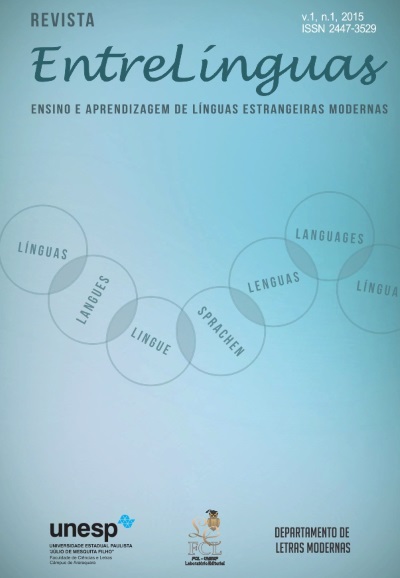Reading, interpretation and transcreation: conceptions of translation among german philosophy students
DOI:
https://doi.org/10.29051/el.v1i1.8057Keywords:
German as a foreign language teaching and learning, German for Specific Purposes for Philosophy readers, Translation, E-learning German courses,Abstract
The interest in learning German is often triggered by the desire and need of reading German texts in their source languages, a fact that is commonly observed among Philosophy students. This paper aims at presenting an e-learning German course for Philosophy students who sought linguistic enhancement in order to better understand texts of the area in their source language and focused on different conceptions of translation. To this end, we describe the course in detail and analyze the discussions held in four online forums, seeking to identify the notions of translation imbued among the course participants. The results indicate, on one hand, the validity of e-learning courses for German students with specific demands such as understanding and translation of philosophical texts. On the other hand, the considerations here presented show different conceptions of the act of translation. Our goal is to contribute to the field of translation studies, as well as highlighting an interesting way to be followed in German as a foreign language teaching and learning.
Downloads
Downloads
Published
How to Cite
Issue
Section
License
Os manuscritos aceitos e publicados são de propriedade da Revista EntreLínguas. Os artigos publicados e as referências citadas na Revista EntreLínguas são de inteira responsabilidade de seus autores.
Transferência de direitos autorais – autorização para publicação
Caso o artigo submetido seja aprovado para publicação, já fica acordado que o(s) autor(es) autoriza(m) a UNESP a reproduzi-lo e publicá-lo na EntreLínguas, entendendo-se os termos “reprodução” e “publicação” conforme definição respectivamente dos incisos VI e I do artigo 5° da Lei 9610/98. O artigo poderá ser acessado pela rede mundial de computadores (Internet), sendo permitidas, a título gratuito, a consulta e a reprodução de exemplar do artigo para uso próprio de quem a consulta, desde que haja a citação ao texto consultado. Essa autorização de publicação 328 EntreLínguas, Araraquara, v. 1, n .2, p. 323-328, jul./dez. 2015 não tem limitação de tempo, ficando a UNESP responsável pela manutenção da identificação do(s) autor(es) do artigo. Os artigos publicados e as referências citadas na Revista EntreLínguas são de inteira responsabilidade de seus autores.











